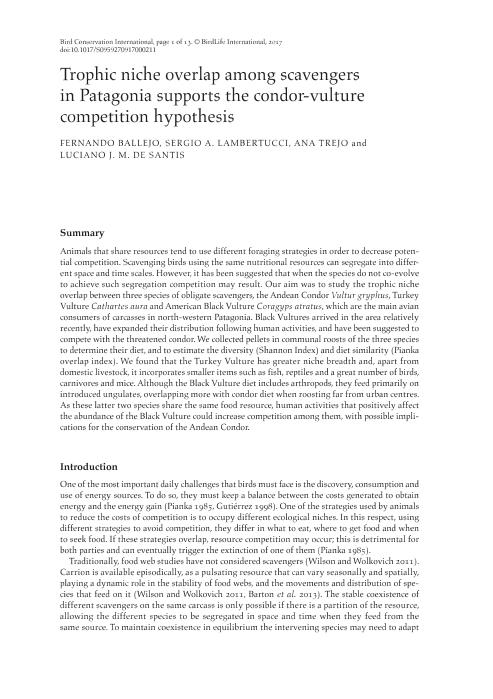Artículo
Trophic niche overlap among scavengers in Patagonia supports the condor-vulture competition hypothesis
Fecha de publicación:
16/11/2017
Editorial:
Cambridge University Press
Revista:
Bird Conservation International
ISSN:
0959-2709
Idioma:
Inglés
Tipo de recurso:
Artículo publicado
Clasificación temática:
Resumen
Animals that share resources tend to use different foraging strategies in order to decrease potential competition. Scavenging birds using the same nutritional resources can segregate into different space and time scales. However, it has been suggested that when the species do not co-evolve to achieve such segregation competition may result. Our aim was to study the trophic niche overlap between three species of obligate scavengers, the Andean Condor Vultur gryphus, Turkey Vulture Cathartes aura and American Black Vulture Coragyps atratus, which are the main avian consumers of carcasses in north-western Patagonia. Black Vultures arrived in the area relatively recently, have expanded their distribution following human activities, and have been suggested to compete with the threatened condor. We collected pellets in communal roosts of the three species to determine their diet, and to estimate the diversity (Shannon Index) and diet similarity (Pianka overlap index). We found that the Turkey Vulture has greater niche breadth and, apart from domestic livestock, it incorporates smaller items such as fish, reptiles and a great number of birds, carnivores and mice. Although the Black Vulture diet includes arthropods, they feed primarily on introduced ungulates, overlapping more with condor diet when roosting far from urban centres. As these latter two species share the same food resource, human activities that positively affect the abundance of the Black Vulture could increase competition among them, with possible implications for the conservation of the Andean Condor.
Palabras clave:
Scavengers
,
Diet
,
Niche Overlap
,
Patagonia
Archivos asociados
Licencia
Identificadores
Colecciones
Articulos(INIBIOMA)
Articulos de INST. DE INVEST.EN BIODIVERSIDAD Y MEDIOAMBIENTE
Articulos de INST. DE INVEST.EN BIODIVERSIDAD Y MEDIOAMBIENTE
Citación
Ballejo, Fernando; Lambertucci, Sergio Agustin; Trejo, Ana Raquel; De Santis, Luciano J. M.; Trophic niche overlap among scavengers in Patagonia supports the condor-vulture competition hypothesis; Cambridge University Press; Bird Conservation International; 28; 3; 16-11-2017; 390-402
Compartir
Altmétricas




